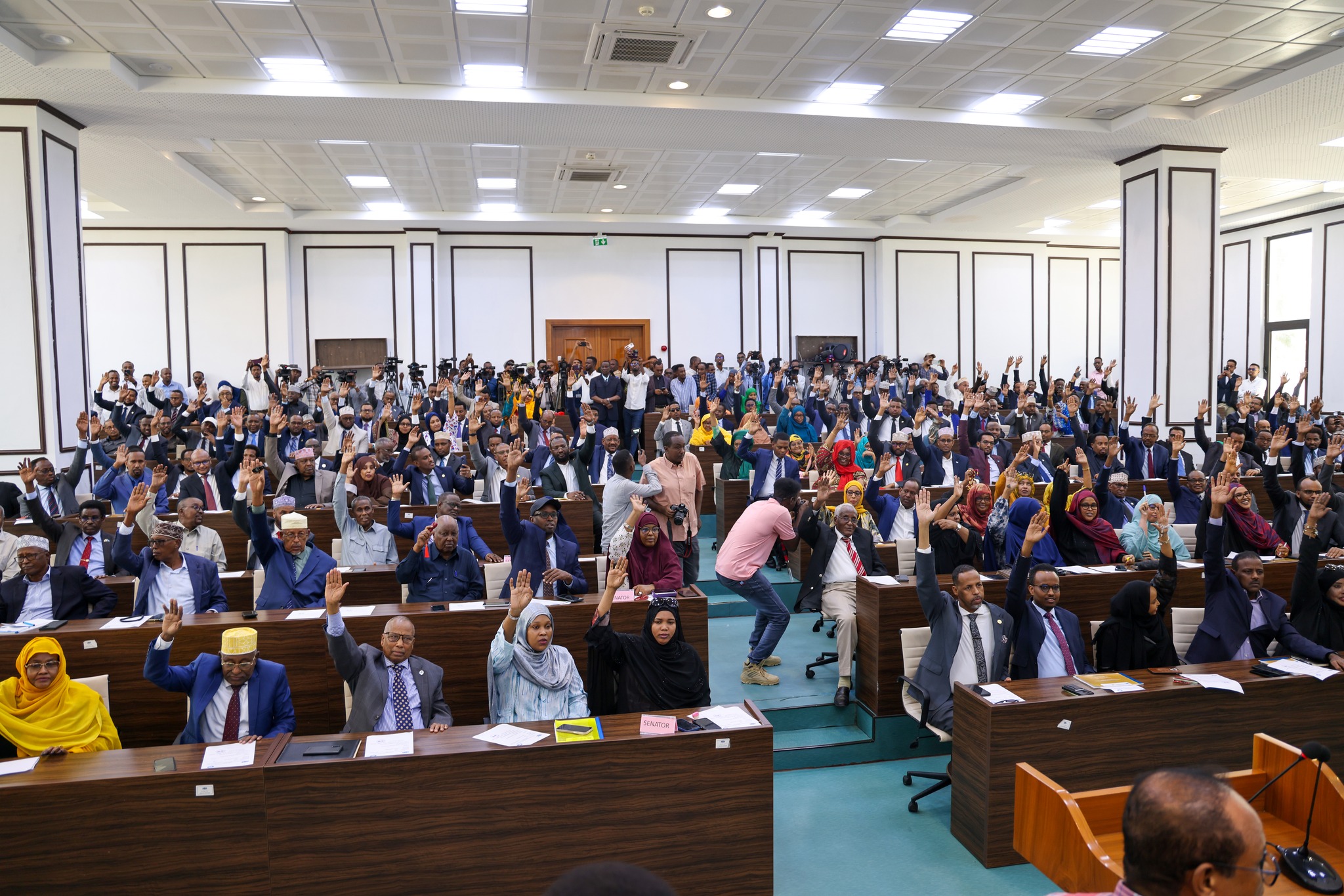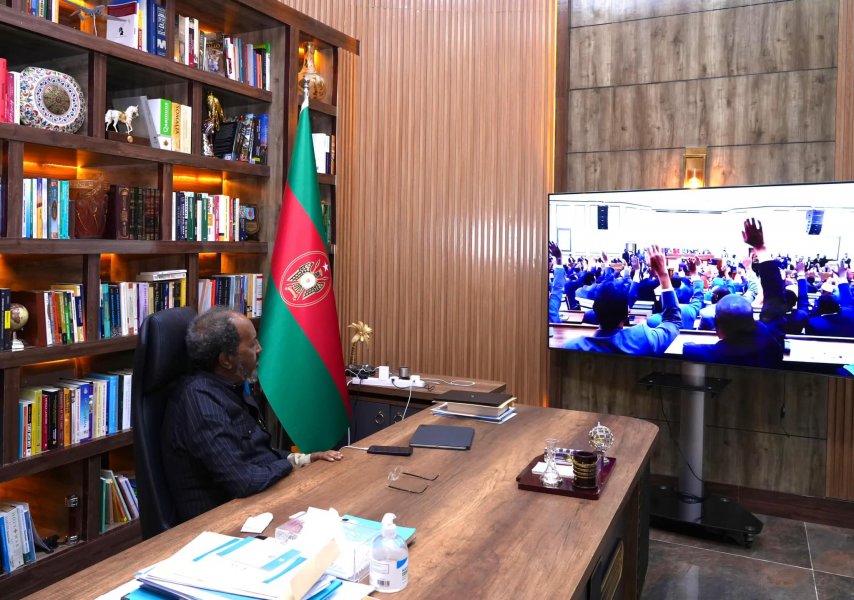
Root Out The Decay: Bribery and Corruption in Somali Parliament
|
02 April 2024 01:23

By - ABDALLE MUMIN*
![Speaker of Lower House Aadan Madobe [centre] announced a total of 212 MPs from the Lower House and 42 Senators from the Upper House participated in the vote. | PHOTO/ OFFICIAL. Speaker of Lower House Aadan Madobe [centre] announced a total of 212 MPs from the Lower House and 42 Senators from the Upper House participated in the vote. | PHOTO/ OFFICIAL.](https://hornobserver.com/uploads/editor/madobe-vote.jpeg)

In a stark reflection of the pervasive influence of corruption on Somali politics, Saturday’s parliamentary vote in Mogadishu to amend the Constitution stands out as a disturbing milestone.
Our sources reveal that this event, characterized by its brazen exchange of bribes for votes, now ranks as one of the most costly in Somali parliamentary history since the contentious presidential election of May 2022.
According to sources, the Saturday's parliamentary vote in #Mogadishu to amend the Constitution can be described as the most expensive in terms of bribery payments in the history of Somali parliament after the presidential election of 2022.
— Abdalle Ahmed Mumin (@Cabdalleaxmed) March 31, 2024
We've tried to get some insights of… pic.twitter.com/gTAMQ49x8d
Delving into the intricate web of backdoor dealings, we have gleaned insights from a variety of sources, including six friendly Members of Parliament (MPs), parliamentary staff, and journalists embedded within the event.
During the proceedings on Saturday, Speaker Aadan Madobe announced a total of 212 MPs from the Lower House and 42 Senators from the Upper House participated in the vote, with 254 MPs ultimately casting their ballots in favor of the constitutional amendment.
![Speaker of Lower House Aadan Madobe [centre] announced a total of 212 MPs from the Lower House and 42 Senators from the Upper House participated in the vote. | PHOTO/ OFFICIAL. Speaker of Lower House Aadan Madobe [centre] announced a total of 212 MPs from the Lower House and 42 Senators from the Upper House participated in the vote. | PHOTO/ OFFICIAL.](https://hornobserver.com/uploads/editor/madobe-vote.jpeg)
As confirmed by MPs and other sources we have spoken with, Each MP reportedly pocketed a substantial $20,000 in exchange for their crucial ‘yes’ vote, with payments directly facilitated by the Office of President Hassan Sheikh Mohamud. From our independent estimation, this collective sum amounted to a jaw-dropping $5,080,000 in bribes.
Moreover, as corroborated by the various sources, the leadership, including Speaker Adan Madobe and his counterparts, received even larger sums ranging from $50,000 to $100,000 each for their pivotal roles in orchestrating the Saturday affair.
In clarity, the amendment of the constitution stood as Hassan Sheikh’s paramount objective, reflecting his ambition to secure not only immediate but enduring expanded powers for himself.
Concerned about the mounting opposition, Hassan Sheikh found himself with no alternative but to resort to bribery amidst financial constraints. As one insider described it, "the payment arrived when it was most urgently needed”, illustrating the dire circumstances driving the vote.
Certainly, Hassan has recently been contemplating a presidential system akin to those led by autocratic figures such as Isias Afwerki of Eritrea, Ismail Omar Geulleh of Djibouti, and Recep Erdoğan in Turkey, where authority of governance is controlled by one man.
Corruption and bribery have long been rampant in Somalia’s indirect elections, indicating a persistent issue rather than a recent development. But this sordid chapter in Somali political history draws eerie parallels to past instances of corruption, notably the infamous presidential election of May 15, 2022, where bribery payments allegedly surpassed $20 million in total.

However, what distinguishes the Saturday event at the Somali parliament is the meticulous effort undertaken by The Villa Somalia to ensure compliance among paid MPs. A well-coordinated strategy was devised, with MPs required to raise their hands during the vote, enabling presidential representatives to monitor and capture their photos, while Hassan Sheikh Mohamud himself was able to observe the vote via live TV feed.
As a journalist who witnessed the high levels of corruption during the 2012 election, I recall the heartbreaking scenes of bargaining between clan MPs and politicians/candidates seeking votes. It was a miserable experience, knowing that despite being a witness to such malpractice, there was little I could do to intervene.
The aftermath of this scandalous affair paints a picture of impunity and moral bankruptcy, with paid MPs now leaving Mogadishu for vacations to Nairobi, Kenya or to Umrah trips to Saudi Arabia, perhaps a testament to the normalization of corruption within Somali political circles.
In unraveling the intricate tapestry of corruption that grips Somali politics, one thing remains clear: until robust measures are taken to combat this pervasive issue, the integrity of governance in Somalia will continue to hang precariously in the balance.
The civil society, media, and international partners must vehemently oppose and refuse such corrupt practices. Failure to do so risks the collapse of societal trust, the erosion of democratic principles, and perpetuates a cycle of poverty and instability that plagues Somali society.
--
*Abdalle is an independent journalist and current secretary general of the Somali Journalists Syndicate. He is a fellow at the Centre for Applied Human Rights at the University of York. Follow Abdalle on X: @Cabdalleaxmed
*Abdalle is an independent journalist and current secretary general of the Somali Journalists Syndicate. He is a fellow at the Centre for Applied Human Rights at the University of York. Follow Abdalle on X: @Cabdalleaxmed
Leave a comment
- Popular
- Rated
- Commented
04/11/2021 - 11:05:02
28/05/2024 - 15:44:10
02/12/2021 - 11:34:53
01/03/2021 - 09:00:37
Opinions
18/05/2025 - 16:26:37
15/05/2025 - 20:16:04
Politics
05/06/2025 - 13:42:50
17/04/2025 - 01:58:17
Terror Watch
Press Releases
05/06/2025 - 12:21:21
02/06/2025 - 21:29:33
 0
0 




































Root Out The Decay: Bribery and Corruption in Somali Parliament
By - ABDALLE MUMIN*